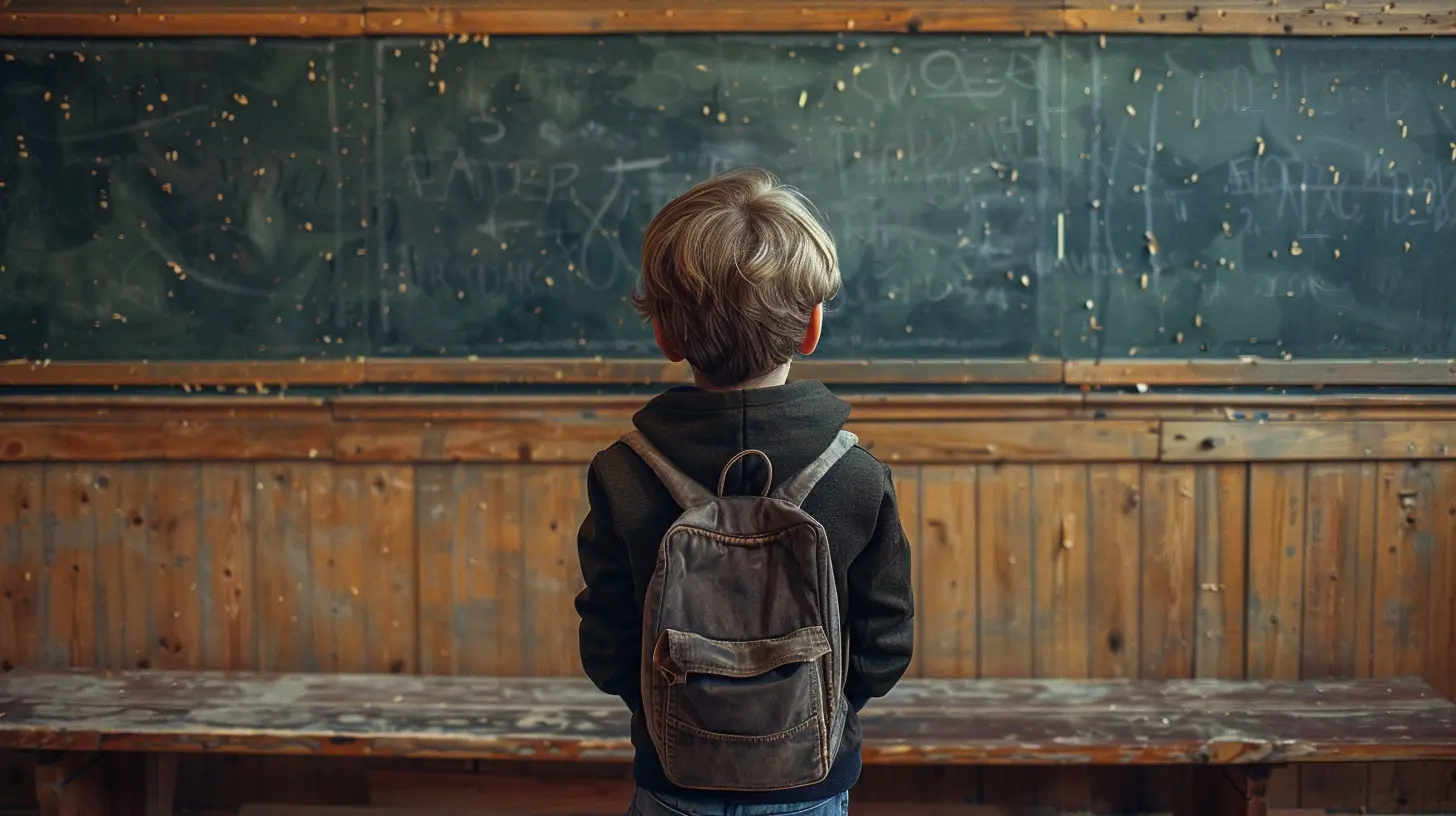How to Handle Perfectionism in Gifted Students
27 January 2025
Gifted students are often known for their exceptional abilities, whether it’s in academics, arts, or other areas. But along with these talents often comes a double-edged sword: perfectionism. While striving for excellence can drive students to reach new heights, it can also lead to overwhelming stress, frustration, and self-doubt. So, how can we, as educators and parents, help these gifted individuals manage their perfectionism without squashing their ambitions?
In this article, we'll dive into what perfectionism is, why it's common in gifted students, and most importantly, how to help them handle it in a healthy, productive way.
Let's unravel the complexities of perfectionism, shall we?
What Exactly Is Perfectionism?
Before we move forward, it’s essential to understand what we’re talking about. Perfectionism is more than just wanting to do well; it's the need to do everything perfectly or not at all. It involves setting impossibly high standards, being overly critical of one's own performance, and often feeling like no accomplishment is ever enough.Gifted students are especially prone to perfectionism because they are used to doing things well and might feel immense pressure to maintain that level of performance. But, as you may guess, no one can be perfect all the time. So, this constant striving for perfection can lead to exhaustion, burnout, and even anxiety.
Types of Perfectionism
Not all perfectionism is created equal, though. There are three main types of perfectionism, and understanding which one a student is experiencing can help in addressing it effectively:1. Self-Oriented Perfectionism: This is when the student imposes harsh expectations on themselves. They believe that they must be perfect to be successful or valuable.
2. Other-Oriented Perfectionism: This type involves imposing unrealistic standards on others. Gifted students might expect perfection from their peers or teachers, which can lead to frustration and disappointment.
3. Socially-Prescribed Perfectionism: In this case, the student feels pressured by others (parents, teachers, or society) to be perfect. They believe their worth is tied to meeting these external standards.
Why Is Perfectionism So Common in Gifted Students?
Gifted students often set the bar high because they’ve experienced success early on. They might be used to excelling without much effort, receiving praise for their abilities, and being labeled as “bright” or “talented.” While these labels are well-meaning, they can also create a sense of identity that’s intertwined with performance.These students begin to internalize the idea that anything less than perfect is a failure. Over time, this mindset can become deeply ingrained. But why does this happen?
The "Gifted" Label
Being labeled as “gifted” can be a blessing and a curse. On one hand, it’s a recognition of a student’s abilities. On the other hand, it can be a heavy burden. When a child is constantly praised for their intelligence, they might start to think their value lies solely in their ability to perform perfectly.This can lead to a fear of failure and a reluctance to take on challenges where they might not immediately excel. Why risk a mistake when you’re used to being the best, right?
Sensitivity and Overthinking
Many gifted students are also highly sensitive and introspective. They tend to analyze situations, outcomes, and their own performance extensively. While this can be a strength in certain areas, it can also fuel perfectionism. They may dwell on minor mistakes or imperfections, blowing them out of proportion and feeling like they’ve let themselves (or others) down.
The Consequences of Unchecked Perfectionism
While a little bit of perfectionism can be a motivator, excessive perfectionism can have serious consequences. When left unchecked, it can lead to:1. Burnout: Constantly striving for perfection is exhausting. Gifted students may push themselves too hard, leading to burnout and a lack of motivation.
2. Anxiety and Depression: Perfectionism often goes hand in hand with anxiety. The fear of failure can become overwhelming, leading to anxiety or even depression.
3. Procrastination: Ironically, perfectionism can lead to procrastination. When students feel that they must do something perfectly, they may put off starting a task out of fear that they won’t meet their own high standards.
4. Fear of Failure: Gifted students may avoid challenges or new experiences altogether because they don’t want to risk failing or looking less than perfect.
How to Help Gifted Students Handle Perfectionism
So, how can parents and educators help gifted students manage their perfectionism in a healthy way? Here are some practical tips to help them strike a balance between striving for excellence and maintaining their well-being.1. Normalize Mistakes and Failure
One of the most important things we can do is normalize failure. Remind gifted students that everyone makes mistakes and that failure is a part of learning. In fact, some of the most successful people in the world have failed numerous times before reaching their goals.Instead of focusing on the mistake itself, shift the conversation to what can be learned from it. Emphasize the idea that mistakes are stepping stones toward improvement, not signs of inadequacy.
Example:
When a student receives a lower grade than expected, instead of asking, “Why didn’t you get an A?”, try asking, “What did you learn from this test? How can we improve next time?”2. Encourage a Growth Mindset
A growth mindset, a concept developed by psychologist Carol Dweck, is the belief that abilities can be developed through hard work, dedication, and learning from mistakes. Help students realize that intelligence and talent aren’t fixed traits—they can grow and evolve with effort.Gifted students may fall into the trap of believing that their abilities are static. If they hit a wall, they may think they’ve reached their limit. By encouraging a growth mindset, you’re helping them understand that challenges and failures are opportunities for growth, not reasons to give up.
Example:
Praise effort over results. Instead of saying, “You’re so smart,” try saying, “I’m proud of how hard you worked on this.”3. Set Realistic Goals
Gifted students often set unattainably high standards for themselves. Help them break their goals down into smaller, more manageable steps. This not only makes the task at hand seem less daunting, but it also helps them experience success along the way, building their confidence and reducing the pressure they feel to be perfect.Example:
If a student is working on a big project, help them set mini-goals, such as completing one section of the project at a time. Celebrate each milestone!4. Focus on the Process, Not the Outcome
Gifted students tend to focus on the end result—getting that A, winning the competition, or finishing the project perfectly. But the process of learning, experimenting, and growing is just as important.Encourage them to take pride in their effort, creativity, and perseverance, regardless of the final result. By shifting the focus away from the outcome, you’re helping reduce the pressure they feel to be flawless.
Example:
If a student is working on a creative writing assignment, instead of focusing on the final draft, ask them about their brainstorming process, their ideas, and how they developed their characters.5. Model Healthy Perfectionism
Children often mirror the behaviors of the adults around them. If you're a parent or teacher who struggles with perfectionism, it's important to model healthy coping mechanisms. Show them that it's okay to make mistakes and that learning is a process. Be open about your own challenges and the steps you take to overcome them.Example:
If you make a mistake at work or in your personal life, share it with your student and talk about how you’re working to fix it.6. Teach Time Management and Self-Care
Gifted students may overextend themselves, trying to do everything perfectly. Teach them the importance of time management and prioritizing tasks. Help them set boundaries and understand that rest and relaxation are essential parts of success.Encourage them to take breaks, pursue hobbies, and engage in activities that bring them joy outside of academics or their area of giftedness. Self-care is crucial in combating burnout.
Example:
Help them create a daily or weekly schedule that includes time for relaxation, hobbies, and downtime. This prevents them from becoming consumed by their academic responsibilities.Conclusion: Encouraging Balance and Resilience
Gifted students already have the drive to succeed, but they need support in learning how to handle perfectionism so that it doesn’t hinder their progress or well-being. By normalizing mistakes, encouraging a growth mindset, setting realistic goals, and modeling healthy behavior, we can help them learn to balance their high aspirations with self-compassion and resilience.Remember, it’s not about lowering expectations—it’s about teaching them that they don’t have to be “perfect” to be successful. By fostering a healthy attitude toward perfectionism, we’re not only helping them excel but also preparing them for the challenges life will inevitably throw their way.
all images in this post were generated using AI tools
Category:
Gifted EducationAuthor:

Zoe McKay
Discussion
rate this article
18 comments
Maura McGarvey
This article provides valuable insights into addressing the challenges of perfectionism in gifted students. The strategies outlined are practical and essential for fostering a healthy learning environment. Thank you for sharing such thoughtful approaches that can truly benefit educators and students alike!
April 3, 2025 at 11:43 AM

Zoe McKay
Thank you for your kind words! I'm glad you found the strategies helpful for fostering a supportive environment for gifted students.
Storm Porter
Perfectionism in gifted students can stifle creativity and hinder growth. Encouraging a mindset that values effort over flawless results fosters resilience and supports their emotional well-being while nurturing their talents.
February 16, 2025 at 8:37 PM

Zoe McKay
Thank you for your insight! Shifting the focus from perfection to effort is indeed crucial in supporting gifted students' growth and creativity.
Haze Edwards
This article offers valuable strategies for educators and parents to support gifted students grappling with perfectionism, emphasizing the importance of fostering resilience, promoting a growth mindset, and celebrating effort over outcome.
February 15, 2025 at 3:54 AM

Zoe McKay
Thank you! I'm glad you found the strategies helpful. Fostering resilience and a growth mindset are essential for supporting gifted students in overcoming perfectionism.
Blake Palmer
This article provides invaluable insights into supporting gifted students grappling with perfectionism. Remember, fostering a growth mindset allows them to embrace mistakes as learning opportunities. By nurturing their resilience and creativity, we can help them thrive academically and emotionally—encouraging a balanced approach to their exceptional abilities.
February 14, 2025 at 11:58 AM

Zoe McKay
Thank you for your thoughtful comment! Embracing a growth mindset is indeed crucial for helping gifted students navigate perfectionism and thrive in both academics and life.
Georgia Chapman
This article offers valuable insights on managing perfectionism in gifted students. Recognizing their unique pressures and providing practical strategies can significantly enhance their motivation and well-being in academic settings.
February 13, 2025 at 4:45 AM

Zoe McKay
Thank you for your thoughtful comment! I'm glad you found the insights valuable for supporting gifted students.
Thistle Summers
Great insights! Encouraging self-compassion in gifted students can significantly reduce perfectionism and enhance learning.
February 12, 2025 at 7:36 PM

Zoe McKay
Thank you! I completely agree—self-compassion is key to fostering a healthier mindset and enhancing the learning experience for gifted students.
Skye McCoy
Embrace progress over perfection; it's a journey worth taking.
February 11, 2025 at 9:38 PM

Zoe McKay
Absolutely! Emphasizing progress helps gifted students appreciate their growth and reduces the pressure to achieve perfection. It's a vital mindset shift for their development.
Petra Cruz
This article offers valuable insights into supporting gifted students grappling with perfectionism. By fostering a nurturing environment and encouraging resilience, educators can empower these students to embrace growth and learning over unattainable standards.
February 7, 2025 at 4:48 AM

Zoe McKay
Thank you for your thoughtful comment! I'm glad you found the insights valuable. Supporting gifted students through resilience and a nurturing environment is crucial for their growth.
Isabelle Jennings
Embrace the quirks of perfectionism! Remember, even diamonds need a little pressure to shine. Let’s sprinkle some fun into the pursuit of excellence and remind our gifted students that it's okay to have a few 'oops' moments along the way!
February 4, 2025 at 9:09 PM

Zoe McKay
Absolutely! Embracing imperfections can foster creativity and resilience in gifted students, reminding them that growth often comes from those 'oops' moments. Let's celebrate the journey, not just the destination!
Elowis McGovern
This article highlights the complexities of perfectionism in gifted students, yet it could further explore the balance between encouraging excellence and fostering resilience. Promoting a growth mindset alongside practical coping strategies could empower these students to embrace imperfection as a vital part of their learning journey.
February 3, 2025 at 2:04 PM

Zoe McKay
Thank you for your insightful comment! I agree that promoting a growth mindset and practical coping strategies is essential for helping gifted students embrace imperfection and build resilience. I appreciate your suggestion for further exploration in this area.
Isabella McClary
Great insights! Supporting gifted students' resilience is crucial for their overall growth.
February 3, 2025 at 4:08 AM

Zoe McKay
Thank you! I completely agree—nurturing resilience is key to helping gifted students thrive.
Cash Wolfe
Perfectionism in gifted students can hinder their growth and well-being. It's essential to foster a supportive environment that encourages risk-taking and resilience, helping them embrace mistakes as opportunities for learning and development.
February 2, 2025 at 12:53 PM

Zoe McKay
Absolutely! Encouraging a growth mindset and creating a supportive atmosphere are crucial in helping gifted students overcome perfectionism and thrive.
Zethryn McKee
This article offers valuable insights into managing perfectionism in gifted students. It emphasizes the importance of fostering a growth mindset and setting realistic expectations. By encouraging self-compassion and acknowledging the learning process, educators can help these students embrace their abilities without the pressure of unattainable standards. Great read!
January 30, 2025 at 11:57 AM

Zoe McKay
Thank you for your thoughtful comment! I'm glad you found the insights on fostering a growth mindset and self-compassion helpful for managing perfectionism in gifted students.
Aris McTiernan
Great insights! Helping gifted students embrace imperfection!
January 30, 2025 at 4:13 AM

Zoe McKay
Thank you! Embracing imperfection is key to fostering resilience and creativity in gifted students.
Verity O'Neal
Embrace imperfections as growth opportunities; it’s essential for fostering resilience in gifted students.
January 29, 2025 at 3:47 AM

Zoe McKay
Absolutely! Embracing imperfections is crucial for helping gifted students develop resilience and learn from their experiences.
Shania Duke
Beneath the brilliance of gifted students lies an intricate web of perfectionism. As we delve into their psyche, we uncover not just the struggle for excellence, but the haunting fear of inadequacy. What secrets do they hide, and how can we help them find solace in imperfection?
January 28, 2025 at 1:45 PM

Zoe McKay
Thank you for your insightful comment! Addressing perfectionism in gifted students involves fostering a growth mindset, encouraging self-compassion, and creating a supportive environment where mistakes are seen as opportunities for learning. By validating their feelings and promoting balance, we can help them embrace imperfection and thrive.
Enid McCarty
Perfectionism can stifle creativity in gifted students; fostering a growth mindset allows them to embrace mistakes as integral steps to mastery.
January 28, 2025 at 4:55 AM

Zoe McKay
Thank you for your insightful comment! Fostering a growth mindset indeed empowers gifted students to view mistakes as valuable learning opportunities, enhancing their creativity and overall development.
Kiera Sanchez
This article offers valuable strategies for parents and educators to support gifted students. Emphasizing balance and self-compassion can help mitigate the negative effects of perfectionism.
January 27, 2025 at 5:27 AM

Zoe McKay
Thank you for your insightful comment! I'm glad you found the strategies valuable. Balancing support with self-compassion is indeed crucial in helping gifted students navigate perfectionism.
MORE POSTS

How EdTech is Making Education More Inclusive for Students with Disabilities

How to Craft Compelling Introductions that Hook Readers

Using Rubrics for Consistent and Transparent Formative Feedback

How to Make Lifelong Friends While Studying Abroad

How to Find Part-Time Work While Studying in a Foreign Country

Developing Assertiveness Without Being Aggressive

Customizing Your Online Learning Experience

Adapting to Different Learning Styles in Online Courses

The Power of Rewriting: Why Your First Draft Isn’t Final

How to Use Exit Tickets for Instant Formative Feedback

Peer Tutoring: A Pathway to Academic Success